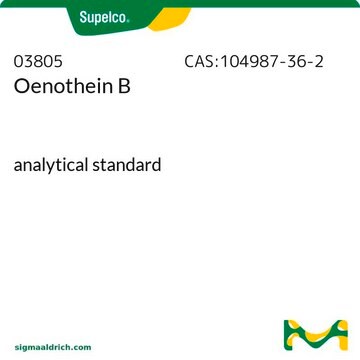Fontos dokumentumok
P0023
Punicalagin
≥98% (HPLC), from pomegranate
About This Item
Javasolt termékek
biológiai forrás
pomegranate
Minőségi szint
Teszt
≥98% (HPLC)
form
powder
szín
faintly yellow to dark yellow
oldhatóság
methanol: 5 mg/mL, clear
alkalmazás(ok)
metabolomics
vitamins, nutraceuticals, and natural products
tárolási hőmérséklet
2-8°C
SMILES string
OC1O[C@@H]2COC(=O)c3cc(O)c(O)c(O)c3-c4c(O)c(O)c5OC(=O)c6c(c(O)c(O)c7OC(=O)c4c5-c67)-c8c(O)c(O)c(O)cc8C(=O)O[C@H]2[C@@H]9OC(=O)c%10cc(O)c(O)c(O)c%10-c%11c(O)c(O)c(O)cc%11C(=O)O[C@@H]19
InChI
1S/C48H28O30/c49-10-1-6-17(31(59)27(10)55)19-23-21-22-24(47(70)76-38(21)35(63)33(19)61)20(34(62)36(64)39(22)75-46(23)69)18-9(4-13(52)28(56)32(18)60)43(66)74-37-14(5-72-42(6)65)73-48(71)41-40(37)77-44(67)7-2-11(50)25(53)29(57)15(7)16-8(45(68)78-41)3-12(51)26(54)30(16)58/h1-4,14,37,40-41,48-64,71H,5H2/t14-,37-,40+,41-,48?/m1/s1
Nemzetközi kémiai azonosító kulcs
ZJVUMAFASBFUBG-UYMKNUMKSA-N
Looking for similar products? Látogasson el ide Útmutató a termékösszehasonlításhoz
Általános leírás
Alkalmazás
Biokémiai/fiziológiai hatások
Tárolási osztály kódja
11 - Combustible Solids
WGK
WGK 3
Lobbanási pont (F)
Not applicable
Lobbanási pont (C)
Not applicable
Analitikai tanúsítványok (COA)
Analitikai tanúsítványok (COA) keresése a termék sarzs-/tételszámának megadásával. A sarzs- és tételszámok a termék címkéjén találhatók, a „Lot” vagy „Batch” szavak után.
Már rendelkezik ezzel a termékkel?
Az Ön által nemrégiben megvásárolt termékekre vonatkozó dokumentumokat a Dokumentumtárban találja.
Az ügyfelek ezeket is megtekintették
Tudóscsoportunk valamennyi kutatási területen rendelkezik tapasztalattal, beleértve az élettudományt, az anyagtudományt, a kémiai szintézist, a kromatográfiát, az analitikát és még sok más területet.
Lépjen kapcsolatba a szaktanácsadással









